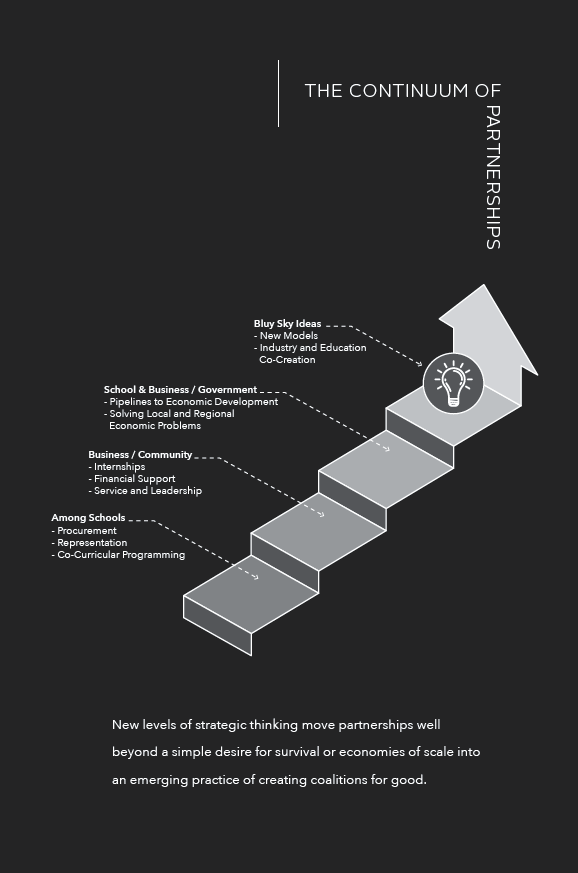April 23 2019
One of the most significant ways in which we are watching institutions shift their business model is through a vast expansion in both the definition and depth of partnerships across their communities and regions. While much has changed since the publication of Surviving to Thriving five years ago, there remains a finite number of institutional revenue sources, reflected originally in that text. Institutions can:
- Grow: Increase enrollment and retention.
- Borrow: Take on debt.
- Shift: Stop doing something in order to do something else.
- Raise: Work toward increased levels of constituent engagement around giving.
- Alternate: Explore alternative revenue streams.
- Focus: Find efficiencies in existing systems or programs in order to concentrate resources.
- Partner: Build interdependent relationships across the local and regional geography with mission-relevant foundations, businesses, and industries.
In the new university, the creative partnerships on the horizon are limited only by our ability to move with agility toward designing and implementing them. Partnerships exist along a continuum that has expanded well beyond traditional cooperative-buying agreements. Among schools, those traditional forms of partnership are still utilized, resulting in operational cost savings such as cohort-organized representation. Between schools and businesses, simple cooperation provides placements for internships, clinical rotations, and general chamber-of-commerce alignments. However, in the new university, the institution is truly in co-creation mode with industry, government, higher-education associations, and other colleges and universities with the end goal of successfully addressing regional, state, and national needs. This level of strategic thinking moves partnerships well beyond a simple desire for survival or economies of scale into an emerging practice of coalitions for good.

DWU’S President Novak has always believed that linking hands with the region is vital to honoring the university’s mission as well as to its growth and sustainability of both enrollment and philanthropic giving. Presidential time dedicated to regional relationships in South Dakota and the Great Plains has been instrumental to shifting the trajectory of DWU’s future. The entrepreneurial heart of South Dakota’s culture means that there is no budget at the state level for support of private higher education; private institutions are entirely self-funded. DWU’s geographic reality also means that philanthropy frequently comes in the form of complex assets including land, timber, and cattle. As such, the success of the institution relies heavily on its connection to and deep understanding of the needs of the region. In 2013, President Novak convened a business-advisory group of fifty leaders representing seven industry sectors to examine how best to equip students for the future. Out of this emerged DWU’s freshman course on innovation, problem-solving, and creativity, and a more intentional focus on soft-skills development across the general-education curriculum. With a greater understanding of DWU’s goals and focus on the regional economy, business leaders were ready to invest in the institution, whose budget for capital improvement and new initiatives is now significantly enhanced by partnership contributions that add value through dollars, human-resource investment, infrastructure investment, and advocacy.
No Margin, No Mission Challenge Questions
- Do you have five or more working partnerships with regional or national funders that impact your margin?
- Have you taken the steps to be an attractive and flexible partner?
- Have you drawn funds from your endowment at a rate of over 5 percent in the last three years?
- Do you use endowment funds for anything other than scholarship aid?
Are you enjoying this blog series? If so, you can get the complete text by ordering "PIVOT: A Vision for the New University." Go beyond excerpts and get the full story by ordering your copy today.
© Credo and www.credohighered.com, 2018. Unauthorized use and/or duplication of this material without express and written permission from this site’s author and/or owner is strictly prohibited. Short excerpts and links may be used, provided that full and clear credit is given to Credo, Credo Press, and www.credohighered.com with appropriate and specific direction to the original content. Please email info@credohighered.com for information on how to obtain a full copy of Pivot: A Vision for the New University or for permission to use excerpts from the book and/or blog series.
Related Blog Posts
Recent Posts
- Richard Dunsworth, J.D., To Receive 12th Annual Courageous Leadership Award December 16 2024
- Meet the 2024 Credo Values Award Recipients August 27 2024
- What is Executive Coaching, Really? June 25 2024
- Credo & The Constructive Dialogue Institute Announce A New Partnership For Higher Education Leadership Development March 7 2024
- Celebrating Women And Gender-Diverse Learners & Leaders February 28 2024
Categories
- Strategy
- Leadership
- Student Success
- Student Success & Retention
- Enrollment
- Pivot
- Strategic Planning
- Leadership Development
- News
- Strategic Enrollment
- Campus Planning and Architecture
- Moving the Needle
- Data
- Research
- Retention
- Campus Master Planning
- Enrollment & Financial Aid
- Academic Programming
- Campus Planning
- Thriving
- Admitted Student Research
- Architecture
- Finance
- Advising
- Admissions




